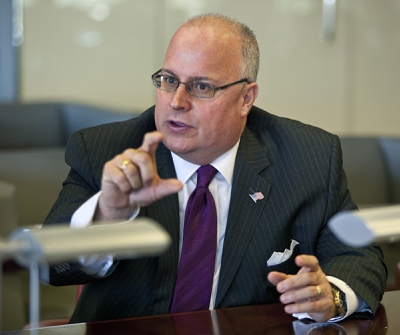Before Nevada Regent Kevin Page tried to pressure UNLV into giving special treatment to one of his family members in 2015, the Board of Regents had adopted ethics standards specifically prohibiting that kind of behavior.
A review of the Board of Regents’ bylaws shows that the board’s ethical code of conduct bars regents from using their power to “attempt to intimidate or influence employees or students to gain unwarranted privileges, advantages, or preferences for the Regent or for his or her family members, other individuals, or business entities.” That standard was in place in 2015, online records show, and remains in the regents’ handbook.
It’s relevant in light of emails that surfaced last month in which Page demanded that UNLV allow his family member to skip a prerequisite requirement in the Lee Business School. When UNLV administrators resisted, trying to reason with Page that the waiver would be unfair to students who had been required to take prerequisite courses and could put the business school’s accreditation at risk, Page issued a nonspecific threat of retaliation.
“Next semester the LBS better not play games with (student) and her getting her classes,” Page wrote in a message dated Aug. 30, 2015. “For some reason, people take kindness for weakness. I am usually very nice but, can change gears when I need to.”
Page’s messages were forwarded to Regent Rick Trachok, then the board’s chairman, who replied that he had received them. But there’s been no indication that Page has been publicly questioned or held accountable for his actions.
Page and Trachok have not discussed the matter, nor has current board Chairman Jason Geddes. All three have either declined or not responded to numerous calls and emails by the Sun seeking comment.
But UNLV sources say they believe Page clearly violated the board’s ethics standards. Speaking on condition of anonymity, campus sources say Page tried to intimidate them into getting what he wanted and was acting only in the interests of his family, not the student body at large. Given Page’s position of authority, they said, they believed their jobs were in jeopardy in denying his request.
"When you have a regent or a relative asking you to do something, the assumption is that you've got to move on that," one source said. "They're in a power position."
The Sun has granted anonymity to sources in order to protect them from possible retaliation by the regents or the Nevada System of Higher Education.
Sources said that after Trachok was made aware of the situation, the emails from Page stopped. That prompted speculation that Trachok confronted Page, but it also left some campus sources wondering if Trachok, a lawyer, merely told Page to stop putting his demands in writing.
Officially, however, the Page situation has been met with silence.
Last week, in the first Board of Regents meeting that has been held since the emails were made public, there was no mention of the matter.
Notably, the regents’ bylaws appear to contain no provision for censuring board members or otherwise holding them accountable on ethical matters. That’s a difference between the regents and other public bodies like the Legislature and judiciary, which have provisions in place to take internal action on ethics issues.
However, the regents’ bylaws state that members of the board are subject to the state of Nevada’s code of ethical standards, which is far more extensive than the board’s and prohibits public officials from using their position to “secure or grant unwarranted privileges, preferences, exemptions or advantages” for themselves, their families and their business associates.
Violations of the state code by the regents are subject to investigation by the Nevada Commission on Ethics.
Since Page’s emails surfaced, his threat to “change gears” has prompted speculation on campus that the situation may have eventually played a role in the regents’ controversial treatment of former UNLV President Len Jessup, who was pressured out of office in the spring of 2018. Jessup, who supported the staff in the Page matter, left UNLV to become president at Claremont Graduate College in Southern California amid complaints among UNLV supporters that he had endured unduly harsh criticism from the regents over campus management issues.
Some supporters have questioned whether he was pushed out so that the regents could find a more agreeable president.
In February, the regents launched a national search for Jessup’s successor under a time frame that would put a new president in place in July 2020. At the same time, they waived a rule that would have prevented the university’s acting president, Marta Meana, from being a candidate for the search.


